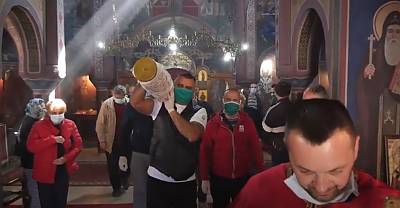Due to the COVID-19 pandemic, the Center for the Intangible Cultural Heritage of Serbia at the Ethnographic Museum in Belgrade, as a competent body in charge of ICH, provides online activities, using digital platforms and social networks, with the focus on exchange of information in digital form.
The Center ensures accessibility to the National Register of the Intangible Cultural Heritage of Serbia (e-Register of ICH) within a broader online platform for the presentation of ICH, by the access to the inscribed elements, including description of the element, photos, video and other relevant information about the bearers and communities.
Having in mind that social networks are playing a prominent role in helping people stay connected, the Official Facebook page of the Center has been recognized and used as an important tool for sharing knowledge on UNESCO concept of ICH and the implementation of the Convention (2003) at the national level, developing new initiatives and monitoring and dissemination of experiences regarding practicing ICH elements and implementation of safeguarding measures during the COVID-19 pandemic.
The bearers of the elements inscribed in the National Register of the Intangible Cultural Heritage of Serbia, in some cases, have adapted their activities according to new circumstances, by reducing activities or number of participants.
On the other hand, some performances, festivals, shows and living heritage events have been cancelled or temporarily postponed. The ritual of making and lighting farmer candles, inscribed in the National Register of the Intangible Cultural Heritage, as a part of Easter rituals in western Serbia, was held in modified form, but with the priority of ensuring continuity of the ritual.
This year, the process of making candles and processions was restricted to a limited number of participants and the celebration was held with provided measures of coronavirus prevention (wearing face masks and gloves, keeping a distance from each other).
On the other hand, the Prayer – St. George’s Day ritual, social practice that is performed once a year as a collective village celebration in eastern Serbia, was cancelled. Furthermore, online environments, namely, social networks, have proven to be a good (and safe) channel for dissemination of knowledge about the ICH elements from the domain of performing arts.
In this regard, bearers of the pipe playing practice have organized online action “Frula for the revival of Serbia” by posting videos in which they are playing this instrument during home isolation.
Another fine example is the online community of bagpipe players (Гајде - Serbian Bagpipes) which was very active in posting diverse content (videos, photos, articles, etc.) on practice of playing bagpipes on the territory of Serbia, with an accent on the actual practice during the pandemic crisis.
Les désignations employées et la présentation des textes et des documents référencés dans cette plateforme n'impliquent de la part de l'UNESCO aucune prise de position quant au statut juridique des pays, territoires, villes ou zones, ou de leurs autorités, ni quant au tracé de leurs frontières ou limites.
